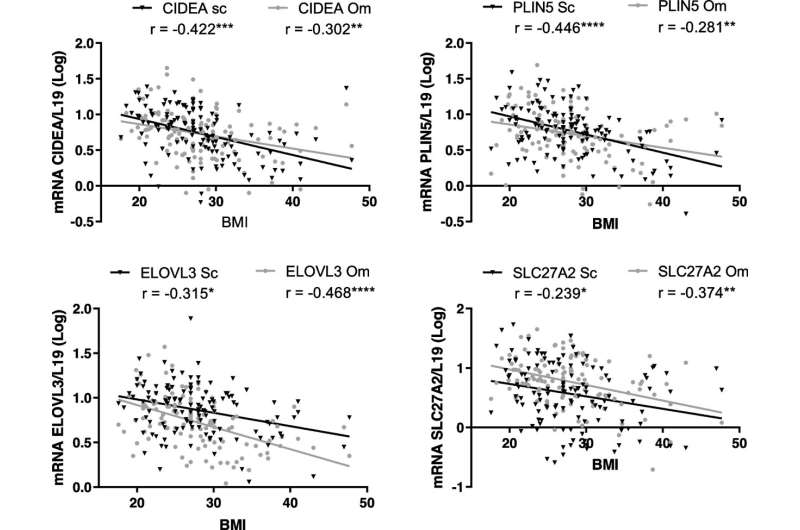This article has been reviewed according to Science X's editorial process and policies. Editors have highlighted the following attributes while ensuring the content's credibility:
fact-checked
peer-reviewed publication
trusted source
proofread
Bacterial fragments from leaky gut help drive obesity, study shows

Scientists at Nottingham Trent University found that microbe fragments called endotoxin enter the blood stream and directly impact how well fat cells function, including their capacity to be metabolically active.
The normal gut contains millions of microorganisms that have essential roles in many aspects of human health. In obesity, however, the wall of the gut can become impaired and leaky, allowing the release of these bacterial fragments into the blood, where they go on to travel through the body to different tissues.
The researchers say the study is a breakthrough in understanding the health of fat cells and how they drive weight gain and associated disease. The study, which also involved the University of Warwick, is published in the journal BMC Medicine.
Dysfunctional body fat is known to contribute to metabolic disease, including type 2 diabetes.
As part of the study the team was aiming to understand how significant weight loss may help to reverse the amount of endotoxin circulating in the blood to reduce the resulting damage to fat cells.
Using a series of experiments they found that fat cells are significantly damaged by endotoxin—and that this reduced their ability to transform into the more metabolically-active brown-like fat cells, which drive weight loss.
The study also found that white fat cells derived from participants with obesity were less likely to transform into brown-like fat cells compared with fat cells from lean individuals, likely due to the higher levels of endotoxin found in the blood of participants with obesity.
The team also examined how weight loss could reverse the circulating gut-derived endotoxin and resulting fat cell damage.
They found that weight loss surgical intervention, such as bariatric surgery, reduced the amount of endotoxin in the blood, which was also associated with improved metabolic health of the fat cells across the participants studied.
"Gut microbe fragments that enter the blood stream reduce normal fat cell function and their metabolic activity, which is exacerbated with weight gain, contributing to increased diabetes risk," said lead researcher Professor Mark Christian, a scientist in Nottingham Trent University's School of Science and Technology.
He said, "It appears that as we gain weight, our fat stores are less able to limit the damage that gut microbe fragments may cause to fat cells. Endotoxin from the gut reduces fat cell metabolic activity and its ability to become 'brown-like fat cells' that can be useful to help lose weight. Our study highlights the importance of the gut and fat as critical interlinked organs that influence our metabolic health.
"This work has built upon previous studies by the team that show the importance of how gut-derived endotoxin damages our fat with weight gain. As such this work suggests the need to limit endotoxin-induced fat cell damage is even more important when you have excess weight, as the endotoxin contributes to reduce healthy cellular metabolism."
Dr. Alice Murphy, a postdoctoral research fellow at Nottingham Trent University added, "These studies with patients highlight that despite gaining weight, if we lose that weight, we can reverse the damage our gut can pose to our fat cells, which ultimately will have a major impact on our health and the benefits of weight loss."
Researcher Dr. Farah Omran added, "Brown-like fat cells are linked with overall healthy metabolism as they are highly metabolically active. We found that increased endotoxin levels, implicated in obesity, act to prevent their appearance and instead force the more unhealthy white fat cells to predominate."
More information: Farah Omran et al, The impact of metabolic endotoxaemia on the browning process in human adipocytes, BMC Medicine (2023). DOI: 10.1186/s12916-023-02857-z




















